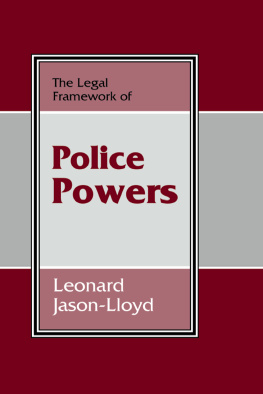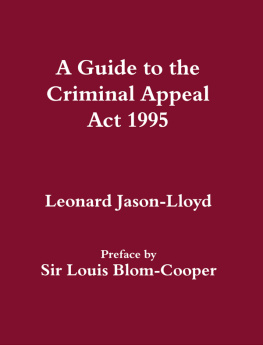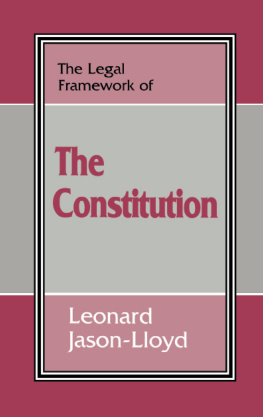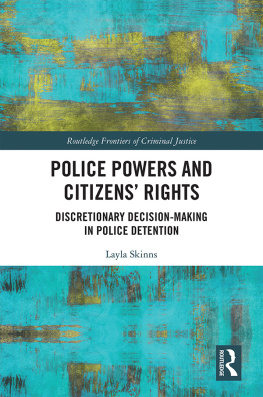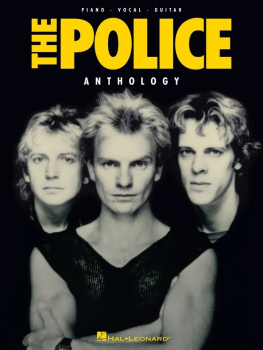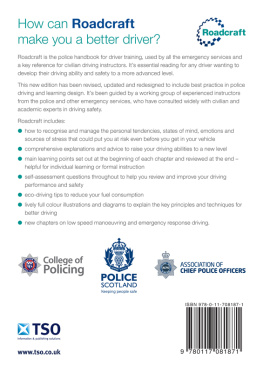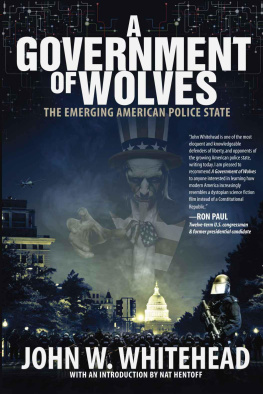Published in 1997 in Great Britain by
Routledge
2 Park Square, Milton Park, Abingdon, Oxon, OX14 4RN
270 Madison Ave, New York NY 10016
Transferred to Digital Printing 2007
Copyright 1998 Routledge.
British Library Cataloguing in Publication Data
Jason-Lloyd, Leonard
The legal framework of police powers
1. Police power England
I. Title II. Police powers
344.202418
ISBN 0 7146 4775 6 (cloth)
ISBN 0 7146 4286 X (paper)
ISSN 0965-3473
Library of Congress Cataloging-in-Publication Data
Jason-Lloyd, Leonard, 1945-
The legal framework of police powers / Leonard Jason-Lloyd.
p. cm. (The legal framework series)
Includes bibliographical references and index.
ISBN 0-7146 4775 6 (cloth) ISBN 0-7146-4286-X (paper)
1. Police-Great Britain. 2. Arrest-Great Britain. 3. Searches
and seizures-Great Britain. 4. Detention of persons-Great
Britain. I. Title. II. Series.
KD4839.J37 1996
345.41052-dc20
[344.10552]
96-26294
CIP
All rights reserved. No part of this publication may be reproduced in any form or
by any means, electronic, mechanical, photocopying, recording or otherwise,
without the prior permission of Routledge and Company Limi
Publisher's Note
The publisher has gone to great lengths to ensure the quality of this reprint but
points out that some imperfections in the original may be apparent
I dedicate this book to all those in the
police service who constitute
the thin blue line
and especially to those in WD and VW Divisions
who for several years were my colleagues.
Contents
Preface
General interest in the study of police powers has increased substantially in modern times, particularly since the early 1980s when it became evident through a spate of serious disorder that more of the public were beginning to question police authority. In response to pressure from a number of sources in addition to general public concern, the Police and Criminal Evidence Act 1984 was passed which constituted possibly the single greatest reform of police powers this century. It is this statute which will receive the focus of attention of this book, although not to the exclusion of all else. Since 1984 Parliament has intervened further by enacting a number of additions to police powers including, more recently, the Prevention of Terrorism (Additional Powers) Act 1996 which was announced in Parliament on 1 April 1996 and was enacted two days later. The provisions of this Act with regard to police powers is included within the text. At the time of completing the final manuscript for this book (24 April 1996), the Offensive Weapons Bill is currently before Parliament and its proposed provisions have also been included insofar as they affect the exercise of police powers.
This book will hopefully provide a useful focus to an increasingly complex and important topic. Its principal aim is to introduce this study to a wide range of persons who are new to the subject. A list of recom-mended further reading is included at the back for those wishing to study police powers in greater depth.
This was enacted on 4th July 1996.
Introduction
Ido solemnly and sincerely declare and affirm that I will well and truly serve our Sovereign Lady the Queen in the office of Constable, without favour or affection, malice or ill will; and that I will, to the best of my power cause the peace to be kept and preserved, and prevent all offences against the persons and properties of Her Majesty's subjects and that while I continue to hold the said office I will, to the best of my skill and knowledge discharge all the duties thereof faithfully according to law.
The above constitutes the solemn declaration taken by all those newly appointed to the office of constable within England and Wales. This ceremony is known as the attestation which takes place before a Justice of the Peace (either a magistrate, or an Assistant Commissioner if taken in London). Exactly how this declaration is put into practice will be examined in subsequent chapters.
On balance the modern police officer does not have a vast number of powers over and above those held by ordinary citizens, and those which are given constitute essential tools in the execution of their duty. This is largely due to the origins of policing in this country being rooted in the common law which has ensured greater legal parity between a constable and other citizens compared to many nations abroad. This feature has led to the English concept of policing by consent, which is much envied by those nations whose police do not enjoy such relative integration within their communities. It is largely for this reason that nearly all police forces throughout the globe are permanently para-military by nature and generally larger in size per head of population. A further distinction between foreign policing and our own domestic system is that this function in England and Wales is currently divided between 43 different police forces whereas policing abroad is usually under more direct and centralised control.
The general concept of policing is not new, in fact various forms of law-enforcement which were in the nature of policing have existed since early Saxon times. However, the first modern style professional police force was established by Statute in 1829 under the auspices of Sir Robert Peel and by 1856 all of England and Wales was covered by a network of police forces. Many believe that the main driving-force behind the 1829 Act was the appalling crime rate particularly in the capital city. While this was undoubtedly a major factor there was also another issue equal in importance, namely the increase in the level of public disorder that had escalated in the eighteenth and early nineteenth centuries.
Whilst the military were traditionally used to quell rioting in places like London and other big cities, there were serious disadvantages in using armed troops. First, long delays were often experienced in trans-porting troops from their respective barracks to the scene of public disorder. Secondly, the only forms of weaponry available were either bullets or bayonets which had drastic consequences. The new police were able to resolve both problems by using wooden truncheons to control riots, and by being deployed throughout London on a regular patrol basis they were able to disperse many unruly gatherings before they escalated into full-scale disorder.
Although often regarded with disdain and suspicion by both populace and even certain persons in authority in their very earliest days, the new police quickly gained the respect and affection still found in the majority of the public today. Some maintain that this effect is waning but, despite recent attacks on our existing policing system, this country still remains the envy of the world with regard to its systems of law enforcement.
One does not have to venture many miles from the shores of Britain to see the marked difference between generally accepted standards of police conduct abroad and those expected and largely fulfilled by the police here.
1
The Structure of Policing in England and Wales
As mentioned in the introduction there are currently 43 police forces in England and Wales, although there is provision for the amalgamation of forces which could result in a smaller number in the future. Nearly all are accountable to a local police authority which usually consists of 17 members comprised of three local magistrates, nine local councillors and five independent persons approved by the Home Secretary. The main exception to this rule is the Metropolitan Police Force in London. At present this force is not accountable to a police authority as such, but comes under the direct control of the Home Secretary who is ultimately responsible to Parliament for all policing throughout England and Wales. (The City of London Police are accountable to the Common Council of the City of London.) There are, however, plans to establish a London-wide advisory and overseeing body appointed by the Home Secretary, although this will not be a police authority comparable to those outside London. This provision, together with recent changes to the structure and functions of police authorities, has been effected through the Police and Magistrates Courts Act 1994. This Statute contains a number of other wide-ranging measures that are likely to significantly affect the system of policing in England and Wales in the near future.

